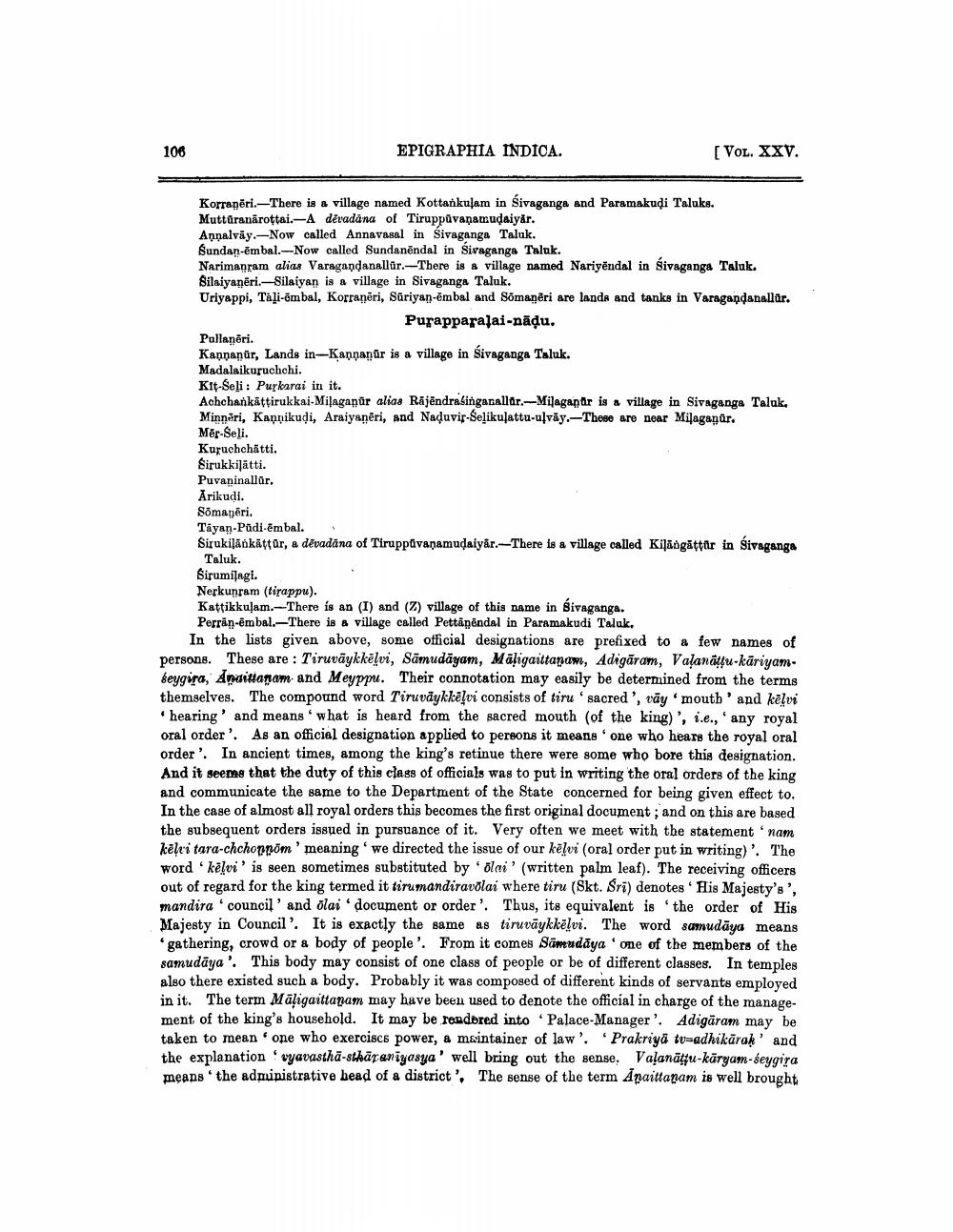________________
106
EPIGRAPHIA INDICA.
[VOL. XXV.
Korranëri.There is a village named Kottankulam in Sivaganga and Paramakudi Taluks. Muttūranarottai.-A dēvadana of Tiruppavanamudaiyår. Annalväy.--Now called Annayasal in Sivaganga Taluk. Bundan-mbal.--Now called Sundanēndal in Sivaganga Tuluk. Narimanram alias Varagandanallür.-There is a village named Nariyëndal in Sivaganga Taluk. Bilaiyanëri.-Silaiyan is a village in Sivaganga Taluk. Uriyappi, Tali-ombal, Korraņēri, Suriyan-embal and Somaņēri are lands and tanks in Varagandanallar.
Purapparalai-nādu, Pallanēri. Kannanur, Lands in-Kannanür is a village in Sivaganga Taluk. Madalaikuruchchi. Kit-Seli: Puskarai in it. Achchankattirukkni-Milaganär alias Rajendrasinganallar.-Milaganor is a village in Sivaganga Taluk, Minnari, Kaņņikudi, Araiyaņēri, and Naduvir-Selikulattu-usväy.-Those are near Milagaŋür. Mēr-Seli. Kuruchchätti. Sirukkiļātti. Puvaninallur, Arikudi. Somapēri. Tayan-Pūdi-embal. Sirukilāökāttūr, a dēvadana of Tiruppuvanamudaiyar. There is a village called Kiļāngattar in Sivaganga
Taluk. Sirumilagi. Nerkunram (tirappu). Kattikkulam.There is an (I) and (7) village of this name in Sivaganga.
Porrin-embal.-There is a village called Pettäņöndal in Paramakudi Taluk.
In the lists given above, some official designations are prefixed to a few names of persons. These are: Tiruvāykkelvi, Sämudāyam, Māļigaittanam, Adigāram, Valanattu-kāriyambeygira, Anaitianam-and Meyppu. Their connotation may easily be determined from the terms themselves. The compound word Tiruväykkēlvi consists of tiru sacred', vāymouth' and kelvi
hearing and means. what is heard from the sacred mouth (of the king)', i.e., any royal oral order'. As an official designation applied to persons it means one who hears the royal oral order'. In ancient times, among the king's retinue there were some who bore this designation. And it seems that the duty of this class of officials was to put in writing the oral orders of the king and communicate the same to the Department of the State concerned for being given effect to. In the case of almost all royal orders this becomes the first original document; and on this are based the subsequent orders issued in pursuance of it. Very often we meet with the statement nam këlui tara-chchopnom' meaning we directed the issue of our kēļvi (oral order put in writing). The word "kēlvi' is seen sometimes substituted by Wolai' (written palm leaf). The receiving officers out of regard for the king termed it tirumandiravolai where tiru (Skt. Sri) denotes' His Majesty's', mandira "council' and olai document or order'. Thus, its equivalent is the order of His Majesty in Council'. It is exactly the same as tiruvāykkelvi. The word samudāya means 'gathering, crowd or a body of people'. From it comes Sūmudāya 'one of the members of the samudāya'. This body may consist of one class of people or be of different classes. In temples also there existed such a body. Probably it was composed of different kinds of servants employed in it. The term Māligaittanam may have been used to denote the official in charge of the management of the king's household. It may be rendered into Palace-Manager'. Adigaram may be taken to mean one who exerciscs power, a maintainer of law'. Prakriya tv-adhikārak' and the explanation ! vyavasthā-sthāranīyasya' well bring out the sense, Valanātu-kārgam-seygira means the administrative head of a district'. The sense of the term Anaittanam is well brought




